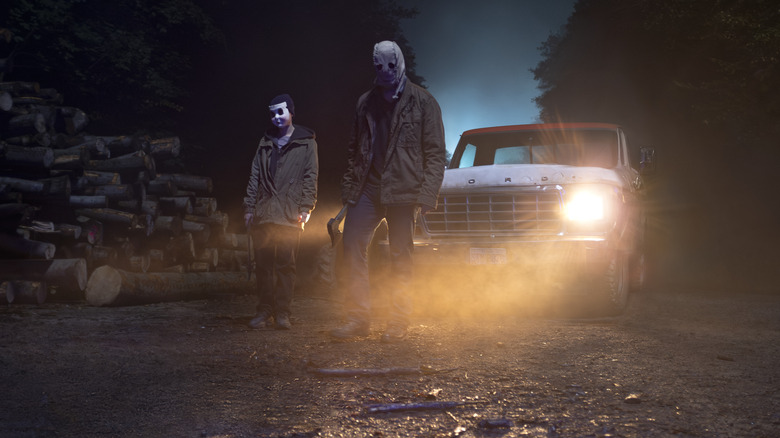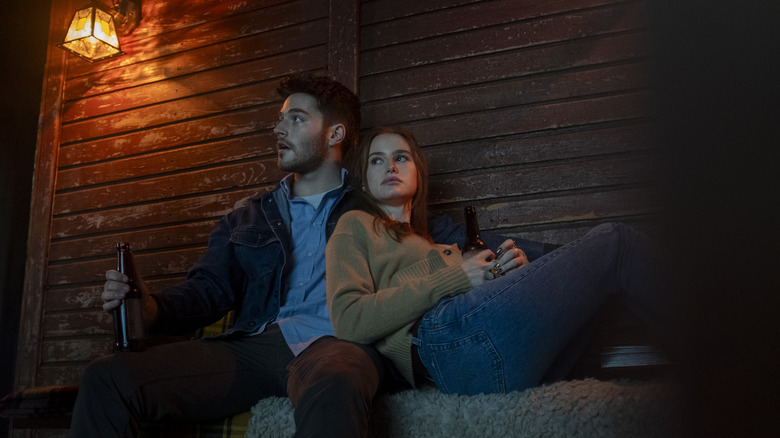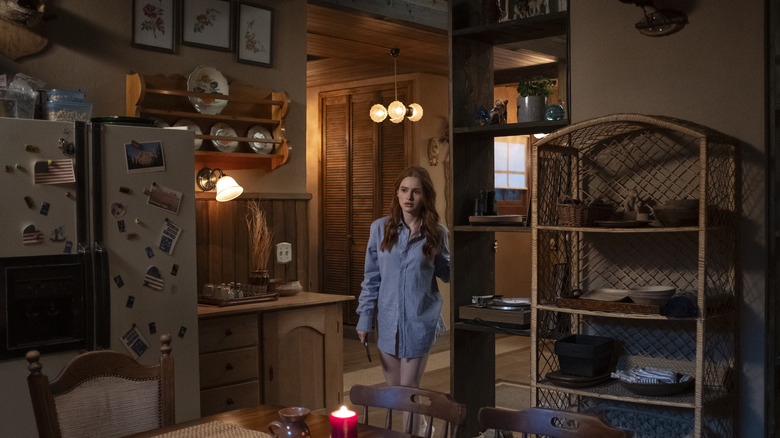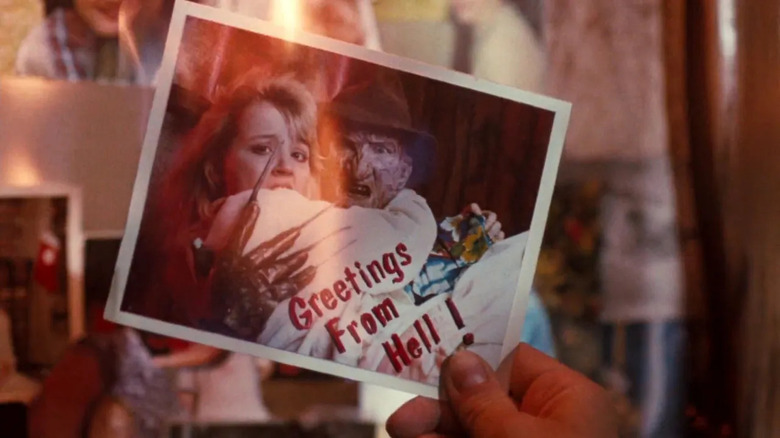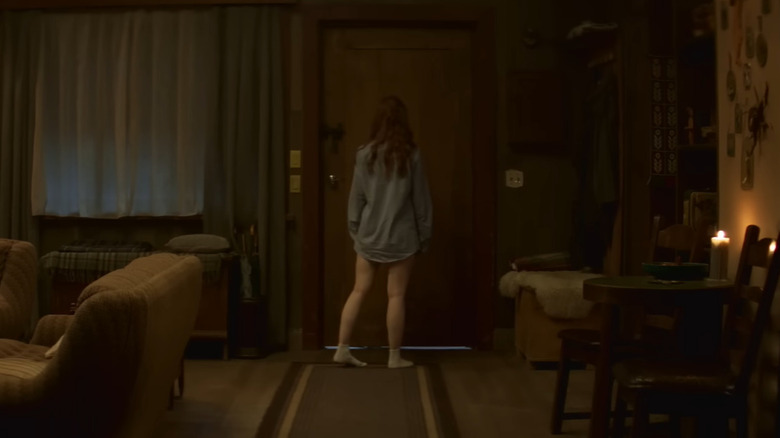Director Renny Harlin Talks About His Strangers Trilogy And Playing With Horror Icons [Exclusive Interview]
When it comes to the horror genre, there's no larger fear than the fear of the unknown. Perversely (in defiance of good creepy storytelling) but understandably (because what better way is there to combat fear of the unknown than by education), audiences and filmmakers are drawn to continue the story of a number of ambiguous horror films through sequels, remakes, reboots, and other franchise-expanding efforts.
The original "The Strangers" is one of the most unsettling home invasion movies ever made, thanks to the large amount of realism and ambiguity surrounding the titular masked killers. Contrary to popular belief, there is an "explanation" of sorts for their actions in Bryan Bertino's 2008 film and Johannes Roberts' 2018 sequel, "The Strangers: Prey at Night" in the repeated line "Because you were home," indicating that their murder spree is nothing more than random violence unleashed due to opportunity. Yet the identities of Dollface, Pin-Up Girl, and the Man in the Mask (along with whoever this girl "Tamara" is they keep asking for, if she's even real) have never been divulged or even explored.
Enter Renny Harlin. Over the course of his nearly 40-year career, the Finnish filmmaker has repeatedly proven himself time a master of multiple genres, especially action ("Die Hard 2," "Cliffhanger," "The Long Kiss Goodnight") and horror ("Prison," "A Nightmare on Elm Street 4: The Dream Master," "Deep Blue Sea"). He's not only bringing the Strangers back to cinema screens, he's doing it over the course of three new films written by Alan R. Cohen, Alan Freedland, and Amber Loutfi and starring Madelaine Petsch, within which he aims to delve deeper into the killers and their world. Before premiering a first look at his "Strangers" trilogy at New York Comic Con, Harlin took some time to speak with me about his inspiration for the new films, his approach to sequels, and his thoughts on horror in general.
Note: This interview has been lightly edited for clarity and brevity.
Answering questions and asking new ones
The original "Strangers" came out in 2008 and "Prey at Night" came out in 2018. They were 10 years apart, from two different directors. Now we're getting three films from you in fairly quick succession. There's not a ton of lore with those first two films in terms of mythology and such. So I was really interested in what drew you to make a "Strangers" trilogy? Was it a love of the first two films? Was it whatever you guys have cooked up for these three that really inspired you? What was it that drew you to the project?
The original "The Strangers" is one of my favorite horror films ever. I remember seeing it not knowing anything when I went to the theater and just being blown away by the randomness of the events, because the whole heart of the movie is that it's ordinary people under extraordinary circumstances. It's something that is, I think, everyone's worst fear: That in a safe home environment, there's a home invasion for reasons that you absolutely don't understand at all. And then just horrible violence ensues. So when my producer, Courtney Solomon, sent me the script, and I opened it and I realized it was 280 pages long, I was just wondering, What is going on? And I read the whole thing in one sitting and was just blown away by it.
So the opportunity, the chance of a lifetime to take a film that you loved, be able to remake it, and then answer some of those questions that I think all of us who enjoyed the original were left wondering, like, "Why? Who were the Strangers? Why did they do this? Is this completely really random, or is there something behind this or at least some reasons why somebody is a senseless, horrible serial killer?" And maybe more than anything, exploring that if one of the characters, in this case, the main female character, played by Madelaine Petsch, if she lives through this, how does this experience of horrible senseless violence, how does it affect a person mentally and physically? And how do you continue with your life? The chance to explore that was just too much to pass. I was absolutely determined to do this after I read the script and I said, "This is just an opportunity I can't pass by."
Doing justice and doing honor to the original film was of course the most important thing. So me being a fan myself, I knew what made the first movie tick for me, and I wanted to offer the same experience to the fans and to the people who are new to the whole concept. We didn't go with the sequel, we didn't explore that in any way. So for us, the original film is our Bible, and our second movie and third movie explore the hypothetical case of what happens — what if the first movie just continued and didn't end there? What happens to Madelaine Petsch's character? How did she change? What is she going to do? What's her journey from here on?
Now that we filmed all three, we realized that we did answer a lot of the questions the fans and anybody who sees the first movie would have. But in a way, we left even more questions unanswered in the end of the third one. So I hope people love these and they're very successful and we get to make many more and continue to really follow Madelaine's character and her journey.
'It's a good time to explore something like this'
"The Strangers" films are known for being fairly bleak and brutal. You yourself in your career have had your very fair share of very brutal villains in your films. Do you think you're trying to maybe outdo yourself or really go into that theme more with this trilogy? Is the brutality of evil something that you're drawn to as a concept, or is it just a byproduct of villainy for you?
Well, I think I've always been drawn to this genre, and I can credit my mom for it since I was six years old. She introduced me to Hitchcock, and when I was eight, I saw "Rosemary's Baby" in a movie theater. So somehow horror has always been a huge part of my life and has fascinated me as a genre and the exploration of fear and violence. So I know this was it for me; it was an opportunity to really just go deeper than ever, instead of an hour and a half, [or] an hour and 45 minutes of a story. Now I have four and a half hours or more of just going deeper and deeper into exploring where does evil come from and why, and can it be explained, or is it just random? And I think also, the world in the 15 years since the original film, the world has changed a lot, and not necessarily always in a better direction. It's not like we've just become more gentle and smarter and just dancing in a beautiful field, holding hands. In many ways, things have gotten more intense and more unpredictable in our daily lives.
So I think in that sense, it's a good time to explore something like this. The important thing to me about all three films was to keep them intimate and definitely keep them real. So in the case of these movies, bigger is not necessarily better, but the reality is the key, and that's what we wanted to hold onto. While of course, it's a cinematic experience and you don't want to keep repeating yourself in this film. So in certain ways, I would say that cinematically, the second film becomes more epic and the third movie even more epic. But that doesn't mean that we start blowing up stuff or doing some elaborate action sequences. But I would say that it's epic in a way that we explore the human mind in a deeper and more complicated way than at least I've ever done in any of my movies.
Continuing a legacy of horror
One of the things that I've loved about your work, especially films like "A Nightmare on Elm Street 4," is you coming into these iconic horror franchises and really making these films your own while still being beholden to what had come before. So how, in this instance and also in those older films, do you personally approach continuing a legacy, a franchise?
Good question. I've always thought that if you're doing a sequel, for example, like in the case of "Nightmare on Elm Street," you definitely have to be faithful to what's come before you and you have to ... you can't sort of pull the rug from under the [audience's] feet. You have to give them the comfort. It's kind of like eating your favorite food. It has to have the same taste and feel like the original, but you have to hopefully make it even more delicious and surprise the audience with something that is fresh and new about it. There's no sense of making a copy of the original. So that was definitely my recipe.
And then the main thing was really how to continue the exploration in the second and the third movie so that you feel like you are in "The Strangers" universe. This is exactly why we love the original, but we get more. We go deeper.
If we talk about "Nightmare on Elm Street," I felt like ... we took some risks with that film. We definitely pushed it further and went in new directions, and it really paid off. As weird as it might sound — and I don't want it to sound pretentious in any way — but for me, really, movies are about, they are entertainment, they're an art form. And I was just a beginner. I was maybe 28 years old when I did "Nightmare on Elm Street 4," but I regarded it as an art film, and I wanted to make a piece of art. Same way right here: I wanted these movies to reflect life, but through the lens of an artist, and make them as artful as possible and entertain people, but in a very serious way. So I, being a fan myself, I really wanted to make a series of films that would give me, the fan, a great journey and make me realize that some of my assumptions from the original film were maybe right, and some were completely wrong. And that in the end of these three movies, I would want to see more. I want to keep exploring these characters to understand more.
'I don't think we would want to give this to anybody else'
It's interesting that you've made sequels before, and you've had sequels made to your films before, but this might be the first time you're making multiple films in the same universe, in the same franchise, yourself. Have you ever been tempted before in your career to make a sequel to one of your own films? I mean, maybe a "Long Kiss Goodnight 2" or something? I know that Sylvester Stallone's talking about a new "Cliffhanger" and all that. Was that ever on the table for you?
Yes, it's definitely been in my mind a couple of times. I would say in the case of "Cliffhanger," I always was fascinated by the idea of making a sequel. But it's been a weird journey. There's been so many producers and directors and writers who've tried to crack the sequel to "Cliffhanger" over decades. It's always announced that there's some kind of a sequel or reboot or something, and nobody's been able to crack it for some reason. And in a similar way, in terms of "The Long Kiss Goodnight," I loved the character so much and that tone of that movie, and I know Sam Jackson feels the same way. Sam is a good friend of mine, and we always talk about making a sequel. And we've come up with storylines for it and all that, but somehow haven't been able to make it happen. So in this case, of course, this is pretty much the first time anybody's done this, which is, don't make one movie, just make three movies at once.
So I think what was really special about this was that it wasn't a case of, "Let's make this remake of 'The Strangers,' see how it does, and then a couple of years later or something, three years later, we'll make a sequel" — the typical kind of a studio moneymaking mentality — but that the studio believed in this concept so much that when Courtney and I said, "We want to make three of these, because we want to really explore this." So if we just make a remake, it's kind of like, "Oh, okay, they're riding on the original film and now they're just trying to cash in again with the same movie." But we wanted to say, "We want to explore this much deeper." And the fact that the studio said, "Yeah, we believe it. We believe in this script, and we believe in your vision," was an extraordinary opportunity.
I feel I'm so possessive of this movie and these movies that the idea of somebody else making the second movie would've been really weird. They would never understand, I don't think, they couldn't understand the universe that Courtney and I have created. We've worked with the writers really, really closely and this exploration of these characters and exploration of Madelaine's character. And I don't think anybody else could really, the same way, write and direct and produce stories about this character, because it also takes knowing Madelaine. Because of the dozens of actors that we spoke to, finding Madelaine, finding an actor who has the talent, who has the depth, who has the intelligence to portray this victim of these incredible violent acts, and where she goes after that, it's like, I can't think of anybody else who could have done justice to this character but Madelaine.
And you kind of have to know Madelaine to know where you can go with her. So I hope there are more movies, and I sure hope that I get to do them, because then I think that we'll keep the universe solid and stay on the right road and give the audience exactly what they want. It's maybe very selfish to say. There are tons of talented filmmakers out there. But I think in this case, this universe is just so near and dear to Courtney and I that I don't think we would want to give this to anybody else.
"The Strangers: Chapter 1" is due to hit theaters sometime in 2024.
